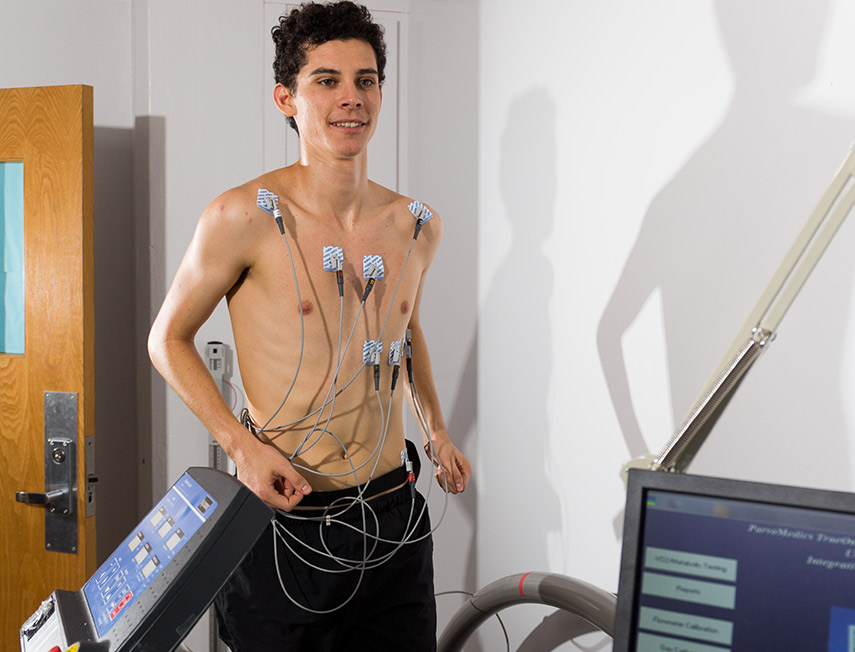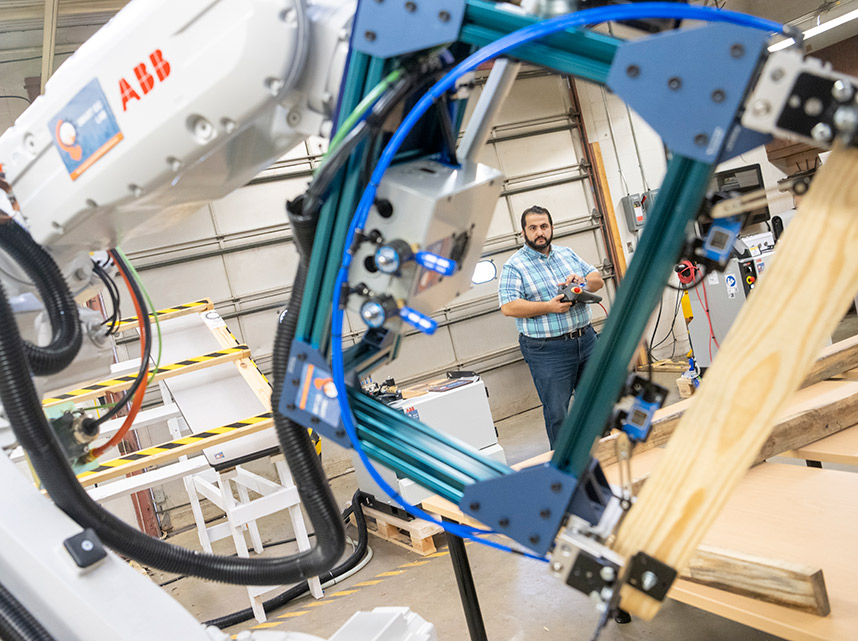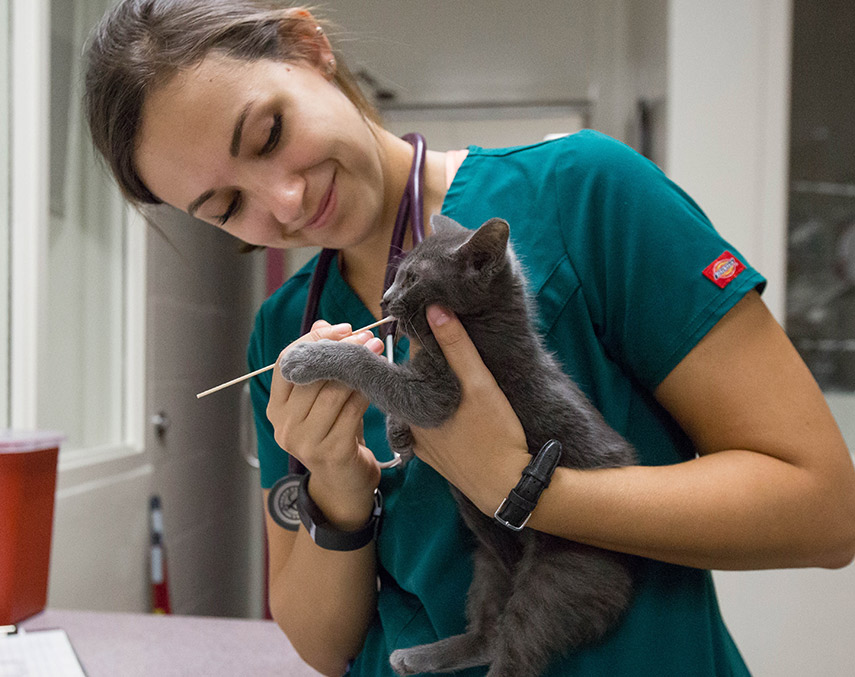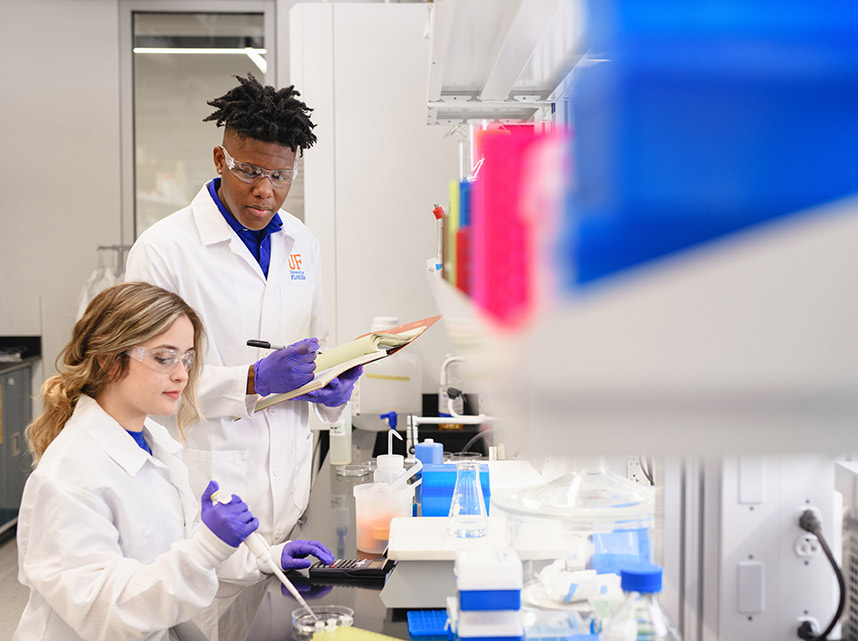AI Initiatives
In 2023, Florida made a significant strategic investment in AI, supporting research initiatives within public benefits for the state and nation.
$18.8M
Awarded in 2023
10
Colleges Received Funds
15
AI Projects Funded
Bringing AI-Enhanced Tech Front and Center
A transformational approach integrating artificial intelligence with all curriculum and interdisciplinary research.
In 2023, the University of Florida received $130 million from the Florida Legislature for strategic initiatives in student experience, research, and technology. UF distributed nearly $19 million of these funds to AI efforts in 10 colleges. The proposals supported interdisciplinary collaborations using AI-enhanced technologies—reinforcing UF’s efforts to lead in using AI to help people.
Integrating AI Into Healthcare, Dentistry, and Veterinary Science
Project: Towards a Health Metaverse
Funding: $2 million
Recipient: UF College of Medicine
UF’s healthcare providers are always looking to improve patient care. Changes in healthcare environment and delivery can be more easily and cost-effectively done in an Intelligent Virtual hospital, where real-time clinical data, environmental sensors, artificial intelligence, and cutting-edge technologies converge to simulate real hospital environments.
Many “what if” scenarios can be thoroughly examined in simulations before they become practice in UF’s operating rooms and ICU. The virtual replicas mirror the physical environments to enable real-world decision making to optimize the patient experience. What can be learned are new options for delivery of care, better medical training, and data management.
The expected returns on investment include cost savings, improved healthcare processes, and ultimately, a better patient experience. As these virtual realities continue to evolve, various medical services are offered online, enabling patients to avoid traveling to a brick-and-mortar facility. This greatly enhances treatment to those with limited access to medical care.
Principle Investigator: Azra Bihorac, MD, MS, FASN, FCCM; Senior Associate Dean for Research Affairs, College of Medicine; Professor of Medicine, Surgery and Anesthesiology; Director, Intelligent Clinical Care Center
Partners: NVIDIA, UF Health, UF Research Computing
Project: Transforming Stroke Care
Funding: $1 million
Recipient: UF’s Evelyn F. and William L. McKnight Brain Institute
Stroke is the fifth leading cause of death and the No. 1 cause of disability in the U.S. It presents a growing health care challenge among Florida’s aging population. This initiative leverages UF’s extensive resources, including the HiPerGator supercomputer and UF Health Shands Comprehensive Stroke Center, to become a leader in stroke AI research. This may potentially establish UF as the top stroke AI research center in the country.
By forming teams of UF investigators who study all aspects of stroke, from prevention to rehabilitation, and pairing them with UF’s AI experts in machine learning and data science, the result can be a multidisciplinary learning experience to benefit current clinicians and health science center students who can become the next generation of stroke researchers. This is promising news for the state, which ranks second in the country, according to the National Center for Health Statistics, in stroke mortality with more than 16,000 stroke deaths annually.
Principal investigator: Brian Hoh, MD, MBA, FACS, FAHA, FAANS, Chair of UF College of Medicine’s Lillian S. Wells Department of Neurosurgery
Project: Improving Treatments for Childhood Muscular Dystrophy
Funding: $480,000
Recipient: UF College of Public Health and Health Professions
The AI Applications to Pediatric Neuromedicine Initiative seeks to improve health care and clinical trials for childhood neuromuscular diseases. UF researchers combine a massive dataset of muscle imaging data from MRIs with artificial intelligence to enhance effective treatments for muscular disorders that can contribute to lifelong disabilities.
Neuromuscular diseases affect more than 1 million children and their families in the United States. The project aims to use AI for more accurate analysis of muscular dystrophy, offering potential in predicting disease progression, aiding in drug development, and assisting families in planning for future treatments and accommodations.
Principle Investigator: Krista Vandenborne, PhD, Distinguished Professor and Chair, Department of Physical Therapy
Project: Virtual Patient Simulation & AI-Enabled Learning to Support Interprofessional Collaboration
Funding: $162,630
Recipient: UF College of Dentistry
This project teaches students and residents from multiple health colleges how to address healthcare needs, pharmacology, cultural sensitivity, and empathy with a virtual patient simulation using AI and Chat GPT. This is a comprehensive, coordinated approach for student/resident management and training, and underscores the necessity of communicating with all healthcare providers during patient treatment.
Project: AI-Enabled Digital Imaging Platform
Funding: $740,000
Recipient: UF College of Veterinary Medicine
Computerized records from more than 100,000 caseloads from UF Vet Med’s varied animal species are being used to create an AI-enabled digital imaging platform to collect, collate, and analyze vet patient data. This ultimately leads to precision medicine, particularly to enhance cancer diagnosis and treatment in companion animals.
This transformative project may position UF as a national leader in cancer treatment and medical innovation. This project can have a great impact on research to improve diagnosis and care in pediatric bone cancer. Canine bone cancer is more prevalent than in humans. UF’s vet med students learn from analytical and diagnostic tools that have not existed until now.
“The UF Health Digital Twin is the first step towards our vision to create a health care metaverse for optimizing patient care, health care processes, and smart hospital spaces of the future using the power of AI.” —Azra Bihorac, MD MS FCCM FASN, Senior Associate Dean for Research Affairs at the University of Florida College of Medicine
Integrating AI Into Engineering, Education, Research, and Athletics
Project: Industrialized Construction Engineering
Funding: $2.5 million
Recipients: UF College of Design, Construction and Planning, and the Herbert Wertheim College of Engineering (HWCOE)
UF’s design, construction and planning, and engineering colleges are partnering to make UF the premier institution for industrialized construction. Using AI tools and robotic automation, UF addresses construction issues such as productivity, safety, quality, and resilience in both residential and commercial construction in a $950 billion dollar industry employing more than 10 million workers.
The downside is the industry is plagued with rising costs of materials and labor shortages, making construction costly and lengthy. Blending human expertise with robotic automation can eliminate costly material waste and accelerate construction time, particularly vital in disaster-stricken communities.
The collaboration uses digital twin technologies where researchers can create digital representations of physical assets to determine best practices for built environments. UF also plans to establish an undergraduate degree program in industrialized construction engineering.
Principle Investigators/Contacts:
- Aladdin Alwisy, Assistant Professor, M.E. Rinker, Sr. School of Construction Management
- Ray Issa, Professor, M.E. Rinker, Sr. School of Construction Management
- Chimay Anumba, Professor and Dean, College of Design, Construction and Planning
- Eric Du, Associate Professor, Engineering School of Sustainable Infrastructure and Environment (ESSIE)
- Kirk Hatfield, Professor and Director, ESSIE
- Iris Rivero, Professor and Chair, Department of Industrial and Systems Engineering
- Forrest Masters, Professor and Interim Dean, HWCOE
Project: SALT-Math: Scalable AI-Augmented Learning by Teaching for Math Education
Funding: $930,000
Recipient: College of Education
This project aims to revolutionize K-12 mathematics learning in Florida and beyond by implementing a learning-by-teaching framework that uses a large language model to improve student outcomes. This innovative AI system, integrated into the Math Nation platform, engages more than 1 million K-12 students in Florida. SALT-Math provides an interactive and enjoyable AI that motivates and engages students for deeper understanding of mathematics.
Principal Investigators:
- Wanli Xing, PhD, Associate Professor of Informatics for Education
- Phil Poekert, PhD, Director, Lastinger Center for Learning
- Zandra de Araujo, PhD, Mathematics Principal, Lastinger Center for Learning
- My Thai, PhD, UF Research Foundation Professor, Department of Computer and Information Science and Engineering
Project: Project Echo, Revolutionizing Teacher Preparation with Augmented Reality
Funding: $467,947
Recipient: College of Education
Project Echo integrates augmented reality into an online early childhood education teacher certification program to address the critical teacher shortage in Florida. The investigators aim to enhance the preservice teacher experience by providing immersive training simulations in virtual environments. The outcome is a practice-based, clinically rich program that ensures quality and accessibility in teacher preparation.
Principle Investigators: Tara Mathien, EdD, Clinical Assistant Professor of Early Childhood Education; Lori Dassa, EdD, Director of Clinical Experiences and Partnerships
Project: Modernizing IFAS Extention Through AI
Funding: $2.7 million
Recipient: UF Institute of Food and Agricultural Sciences (IFAS)
Data-driven decision-making is at the core of UF IFAS and its extension offices in Florida’s 67 counties. Modernizing IFAS Extension with state-of-the-art business intelligence software enhances farming productivity and sustainability statewide. The technology uses AI to collect, store and analyze data from Extension agents and programs.
This funding channels UF’s AI advancements to all Florida Extension areas for access to the latest agricultural insights and tools. This directly benefits farmers, agribusiness, and the broader community, strengthening the state’s economic foundation. UF students’ exposure to business intelligence platforms enhances their learning experiences and make them more competitive in the job market.
Principal Investigator: Christian Christensen, PhD, Director and Extension Associate Scientist, IFAS
Project: Leveraging the Power of Large Language Models to Improve UF Student Experiences
Funding: $474,000
Recipient: Herbert Wertheim College of Engineering
This project helps develop a large language model-based software tool to leverage the computing capabilities of HiPerGator, collecting beneficial data on student performance for instructors and administrators. Via the power of large language models, UF can better serve its students by giving them immediate, meaningful, and personalized feedback to keep them engaged and actively learning.
In its first pilot, more than 2,500 students receive timely feedback on their assignments. This helps students navigate course materials and guidance on all aspects of their learning.
Principal Investigator: Laura Cruz Castro, PhD, Instructional Assistant Professor, Department of Engineering Education and the Department of Computer and Information Science and Engineering
Co-Principal Investigators:
- Ashish Aggarwal, MS, Instructional Associate Professor in the Department of Engineering Education
- Bruce Carroll, PhD, Associate Professor, Department of Mechanical and Aerospace Engineering
- Jinnie Shin, PhD, Assistant Professor of Research and Evaluation Methodology, School of Human Development and Organizational Studies in Education, College of Education
- Gabriel Castelblanco, PhD, Assistant Professor, M.E. Rinker Sr. School of Construction Management
- Walter Leite, PhD, Professor, College of Education
Project: Florida’s Digital Twin
Funding: $1.75 million
Recipients:
- College of Design, Construction and Planning
- College of Medicine
- UF Health
- IFAS
- College of Journalism and Communications
- College of Public Health and Health Professions
- Herbert Wertheim College of Engineering
With more than 8,000 miles of coastline and nearly 22 million residents, Florida faces mounting environmental, social, economic, and public health challenges due to climate change, rapid population growth, and aging infrastructure.
Making “right” decisions for the state’s most urgent needs can be easier with data-driven solutions simulated into a digital twin that replicates the state’s natural and built environments, economy, and public health systems.
Focusing on Florida’s water, lands and communities, UF researchers can coordinate expertise to address the state’s challenges while also helping decision makers on how to prioritize strategic investments, management strategies, and policies to gain the highest returns on investment that can impact the decades to come.
This project solidifies UF’s reputation as an international leader in Digital Twins, useful in solving urgent social and environmental concerns.
Project: UF and Sport Collaborative
Funding: $2.5 million
Recipients:
- Health and Human Performance
- Warrington College of Business
- Herbert Wertheim College of Engineering
- College of Medicine
- College of Journalism and Communication
- University Athletic Association
- The AI² Center
This five-part project propels UF to the global stage in sports performance and healthcare. It addresses topics ranging from athlete development to sports analytics, from video journalism to wearable sensor technology. Athletes push their bodies to the limit, and this project allows UF researchers to capture real-time performance data and leverage AI to reduce athletic injuries and improve performance.
The five parts of this project include:
- Gator AccelerAItor for Sports Analytics: The College of Health and Human Performance and the Warrington College of Business partners with UF’s men’s basketball team to improve recruitment, player evaluation, scouting, and game strategy through AI tools. The program develops a master’s degree program in AI and Sports Analytics.
- AI-Powered Athletics: The Herbert Wertheim College of Engineering and the University Athletic Association monitors athletes wearing sensors to analyze real-time data on the health of student athletes.
- Sport and Health Leaders: This new certificate program is offered through the College of Health and Human Performance.
- Transforming Sport Science Research for EveryBody: The College of Medicine helps advance the analytic capacity of the UF Health Sport Performance Center on research and testing of able-bodied and para-athletes. AI techniques are used to analyze biometrics, enhance performance and safety, predict sport-related injuries, and predict best medical treatment after injury.
- Gator Nation Gameday Live: The College of Journalism and Communications will provide students an opportunity to produce a live, one-hour sports preview show like ESPN’s College GameDay Program.








